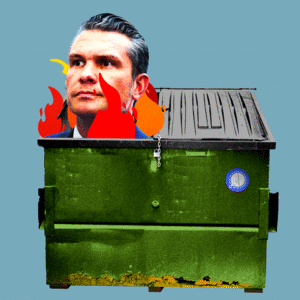The newspaper for the alma mater of Defense Secretary Pete Hegseth published a report on Saturday suggesting that Hegseth plagiarized elements of his senior thesis.
The report in The Daily Princetonian alleges that Hegseth’s senior thesis, submitted in 2003, contained eight instances of “uncredited material, sham paraphrasing, and verbatim copying,” according to a review conducted by three plagiarism experts.
One example was taken from an article in The Washington Post published shortly after 9/11. In Hegseth’s thesis, he wrote, “After Card‘s whisper, Bush looked distracted and somber but continued to listen to the second-graders, joking that they ‘read like sixth-graders.’”
ADVERTISEMENT

The article in the Post reads, “After Card‘s whisper, Bush looked distracted and somber but continued to listen to the second-graders read and soon was smiling again. He joked that they read so well, they must be sixth-graders.” Hegseth does not cite the article in his paper.
While the experts consulted found that the instances of plagiarism in Hegseth’s thesis violated Princeton’s academic honesty regulations, their opinions on whether the violations were serious enough to matter differed.
James M. Lang, author of Cheating Lessons: Learning from Academic Dishonesty, called it a “borderline case,” telling the Princetonian, “There’s no silver bullet here; there’s no smoking gun in terms of a deep example of plagiarism.”
Lang felt that there was more “gray than black and white” in this case, with roughly half of the examples constituting serious plagiarism and the other half only being minor violations.
One example that Lang felt was egregious was a passage similar to one seen in a book about President John F. Kennedy, while Jonathan Bailey, who runs the website Plagiarism Today, did not feel that example was a serious violation.
While Lang felt that an example that involved similarities of 10 or 12 words raised red flags, Bailey disagreed, telling the paper, “Even the ones that were more direct still typically only involve a sentence or two at a time.”
The paper ran Hegseth’s thesis through multiple plagiarism detection models that flagged 12 passages throughout the paper. Of those 12 passages, the plagiarism experts they consulted found that only eight were serious, with the other four not significant enough to warrant concern on their own, though they did say it “fit a broader pattern of some form of plagiarism.”
Hegseth’s thesis was titled ‘Modern Presidential Rhetoric and the Cold War Context’. In it, he analyzed the evolution of presidential speeches from the mid-20th century to the early 2000s and argued that modern presidential rhetoric is primarily influenced by prevailing global threats. As The Daily Princetonian explains, the senior thesis “represents the capstone of the Princeton undergraduate experience and is a graduation requirement for almost all students.” Hegseth graduated from Princeton in 2003.









